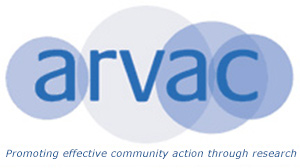ARVAC’S ROUNDTABLE ON ETHICS : WHY THEY MATTER
CONTEXT
In February 2024 ARVAC hosted the third in a series of invited roundtable discussion focussing on the practice of working with community networks and organisations. This series which brings together experienced researchers from universities as well as experienced practitioners has explored a range of practice informed questions for both researchers, practitioners and community based groups. The February conversations considered some of the ethical challenges and dilemmas for those involved in community based research and collaboration.
The discussion was led by practitioners and their experiences and examples they drew on as a way of structuring a reflective conversation . The key themes which emerged included the following :
The importance of researcher responsibility : Whilst institutions and organisations do have ethical approval processes and requirements it remains important that individual researchers accept their responsibility to consider the ethical questions raised by their work. Recognising their responsibility also means acting in this. As part of the necessary process of developing relationships of respect and trust researchers need to act deliberately and consciously in enabling community members/ organisations to participate actively in securing ethical approval prior to institutional approval.
Acknowledging boundaries of practice and understanding: Researchers have their questions and their agendas and , as far as possible, these need to be congruent with the needs of the community group they are working with . But, it is important too that researchers respect the professional, personal and practice boundaries that are present in any setting .
Learning from the research and a commitment to share : The culmination of undertaking a research project with the co-operation of a community group must include the commitment to share the findings as well as recommendations. In principle this should include a commitment to joint publication and dissemination.
Transparency and openness throughout : Researchers are , often, required to share their work with supervisors or commissioners (who may have funded the work ). And whilst this may be a necessary requirement for the researcher it is important that community groups are included as part of those constituencies of interest who have a right to be informed and an opportunity to comment. This approach is likely to lead to a much healthier iterative way of working and learning for the researcher .
A need to engage critically with decision makers : Community based research and enquiry will examine questions of power, responsibility and who has access to decision makers and who does not . Examining the unequal distribution of power and influence will require engaging critically with decision makers.
Community based research requires researchers to act differently: The challenge for researchers in engaging with community based research is to be confident that working ethically will secure support at a local level and creates many opportunities for discussion and learning (some of it only to the benefit of the researcher). Working , thinking and acting differently are likely to be positively received and so contribute to trust based relationships . In effect, this way of working assumes a willingness to commit to a longer time frame than funders or supervisors may expect .
